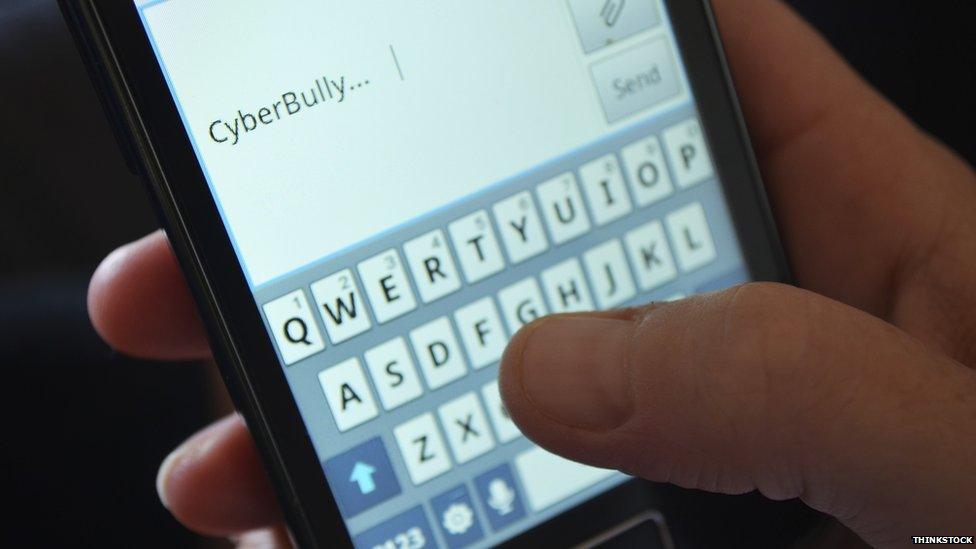What you should expect your school to do about bullying
- Published

You've spent a long day at school - negotiating the corridors, keeping quiet in lessons, hiding in the toilets at break - anything to avoid the bullies.
Getting home and shutting the front door should mean you're safe now.
Then your phone buzzes. And your stomach drops.
You may think because the school day is over and you're not even on the grounds, there isn't anything your teachers can do.
Actually there is - even if the people picking on you don't go to your school, experts say.
"I don't think a school can wash their hands of it," says Adrienne Katz, who runs the Bullying Intervention Group. The group organises national award scheme to recognise excellence in bullying intervention.
"It may be a matter for the police, in which case they could support the student but call in another agency," she says.
"They could help get material taken down off the internet. They could put the student in touch with other agencies, helplines or sources of support."
Ms Katz says Ofsted, the organisation that inspects school standards, would "expect" staff to take on this responsibility.

As part of Newsbeat's investigation into the suicide of 14-year-old Izzy Dix, a number of young people shared their experiences of online bullying.
Listen to The Story of Izzy Dix across five special podcasts.
They said that unlike more traditional forms of bullying, the invasive nature of online bullying - on phones and computers - means they felt they could never escape, even inside their own homes.
The public nature of bullying on social media, where many voices are able to weigh in at once, also amplifies the negative messages heard by the victim, experts told Newsbeat.
Schools in England and Wales have the power to discipline its pupils for bullying, even when it does not happen on its premises.
In fact, advice from ChildNet, external says that where the bully is known to be a current student, he or she "will be dealt with most effectively by the school's own mediation and disciplinary procedures".
"The Education Act 2011 give[s] teachers stronger powers to tackle cyber-bullying by providing a specific power to search for and, if necessary, delete inappropriate images (or files) on electronic devices, including mobile phones," advice from the Department of Education, external states.
In Northern Ireland, guidance issued in 2007, external said abuse which happens outside of school, but affects pupils, "should normally be dealt with through appropriate police and legal action".
Last year a survey of teachers found they were "in limbo" over how to respond to cyberbullying.
Meanwhile the Scottish government has published guidelines, external on how schools should deal with bullying via mobile technologies.
These say that policies should make it "clear that there are consequences" for this kind of behaviour and that in "cases of extreme misuse where criminal events have been recorded" devices should immediately be handed to the police.

According to a spokesman for the National Union of Teachers (NUT), teachers "are very aware of the impact bullying can have on pupils, and take care to ensure that they report and deal with incidents".
Teachers have often previously expressed concern over the size of their workload.
But this is where a good school policy comes in, says Ms Katz.
"When your systems work well it's much less onerous on the individual teacher and the teachers feel more secure because it's clear what pathways they should follow," she says.
The NUT agrees, adding: "It is helpful for schools to have a designated cyberbullying, lead with specific responsibility for managing the recording, investigation and resolution of all bullying incidents."
If you're school isn't giving you the help you need to deal with online bullying, then there are other places you can go to get support.
Experts and charities agree that you should speak to a trusted adult, or the are specific helplines that you can also get care and advice from.
BBC Advice has more information about what to do if you are being bullied.
You can also get help with how to manage your privacy settings online, how to gather and keep evidence of online abuse and what you need to do to report it to social media providers.
This is is the kind of education that Ms Katz wants to be taught in all schools. At the moment, much of the curriculum is not fit for purpose, she says.
"It's almost as if you were letting children loose on the highway without giving them training and support in how to cross the road."
Follow @BBCNewsbeat, external on Twitter, BBCNewsbeat, external on Instagram, Radio1Newsbeat, external on YouTube and you can now follow BBC_Newsbeat on Snapchat